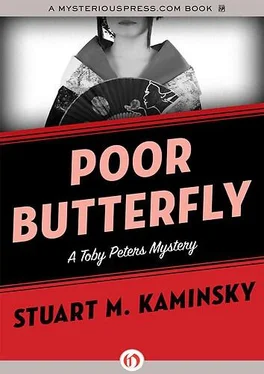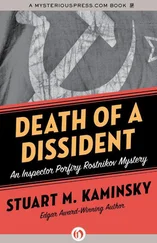Stuart Kaminsky - Poor Butterfly
Здесь есть возможность читать онлайн «Stuart Kaminsky - Poor Butterfly» весь текст электронной книги совершенно бесплатно (целиком полную версию без сокращений). В некоторых случаях можно слушать аудио, скачать через торрент в формате fb2 и присутствует краткое содержание. Жанр: Криминальный детектив, на английском языке. Описание произведения, (предисловие) а так же отзывы посетителей доступны на портале библиотеки ЛибКат.
- Название:Poor Butterfly
- Автор:
- Жанр:
- Год:неизвестен
- ISBN:нет данных
- Рейтинг книги:4 / 5. Голосов: 1
-
Избранное:Добавить в избранное
- Отзывы:
-
Ваша оценка:
- 80
- 1
- 2
- 3
- 4
- 5
Poor Butterfly: краткое содержание, описание и аннотация
Предлагаем к чтению аннотацию, описание, краткое содержание или предисловие (зависит от того, что написал сам автор книги «Poor Butterfly»). Если вы не нашли необходимую информацию о книге — напишите в комментариях, мы постараемся отыскать её.
Poor Butterfly — читать онлайн бесплатно полную книгу (весь текст) целиком
Ниже представлен текст книги, разбитый по страницам. Система сохранения места последней прочитанной страницы, позволяет с удобством читать онлайн бесплатно книгу «Poor Butterfly», без необходимости каждый раз заново искать на чём Вы остановились. Поставьте закладку, и сможете в любой момент перейти на страницу, на которой закончили чтение.
Интервал:
Закладка:
“The job,” I repeated as he opened the door.
“Since you are the Maestro’s idea, albeit a welcome one,” he said, “I prefer that he explain.”
I stepped into a theater that did more than hold its own with the rest of the building. The theater wasn’t lit, but the stage to our left was. The light from the stage was enough to show a thousand or more seats and a balcony. There were even box seats set back above us. And one massive glass chandelier, catching what it could of the light, hung high above the seats.
On the stage were two people. One was a white-haired man about sixty in gray slacks and a long-sleeved gray pullover shirt. The sleeves were rolled up. He was talking to the second person, a woman who, for a second or two, looked like Anne. The body was similar-full, dark. The hair, too, was dark and full with-at this distance-a touch of red from the lights. She was wearing a blue dress with a big shiny black leather belt.
The man’s fingers were dancing and the woman’s head was nodding, her eyes fixed on him. An orchestra sat silently in the pit in front of the stage.
Lundeen moved ahead of me toward the front row. The white-haired man paid no attention to us. The woman glanced in our direction. The similarity to Anne was still there, but there were differences. This woman was probably still in her twenties. Her eyes were blue and her face smooth and childlike.
“Vulnerability,” the white-haired man was saying. Actually, he said “vool-newr-abiliry.” “If you fail to project vulnerability with determination and underlying strength,” he told the woman, “you will give the character no depth. Your voice is an instrument like a fine violin. That you know. But you must coax more from it than perfect notes. This is opera. Performance. You comprehend?”
“Yes,” she said, glancing at Lundeen and me as we sat. The seats were covered with some soft stuffed material.
Stokowski stepped back from the woman and looked at us for the first time. He was about six feet tall and stood erect, his eyes unblinking, finding my face. I smiled at him. He didn’t smile back.
“I have a rehearsal this afternoon,” he said over his shoulder to the young woman. “You work with Giancarlo and the tenor …”
“Martin Passacaglia,” she muttered softly.
“… if he arrives for rehearsal this afternoon,” Stokowski concluded.
“Yes,” she said dutifully.
“It’s getting better,” he said, his eyes still on me.
“Thank you,” she said. She didn’t seem sure whether she should stand there and wait for an escort or make her exit. A woman suddenly appeared from stage left, where she had probably been waiting, and beckoned to her. The woman was thin, dressed in a black suit, and of no clear age. She held a small white dog in her arms. I tagged her for Lorna Bartholomew and the mutt for Miguelito. I watched the two women exit.
Stokowski moved to the front of the stage, looked down at the orchestra for a moment, and pointed at a violinist.
“You,” he said. “Do you have another instrument?”
“No,” said the man.
“Leave,” said Stokowski, walking to the end of the stage and coming down the stairs. “An inferior instrument cuts through my heart like the knife of a Prague butcher.”
The violinist got up. He was about fifty and wore rimless glasses. He made his way out with as much dignity as he could muster while his fellow musicians looked at their own instruments, hoping they would not prove inferior, too.
“Overture,” Stokowski said, stepping to the podium a few feet in front of where Lundeen and I were sitting. The Maestro raised his hands and began to conduct He didn’t use a baton. He didn’t need one. His hands flowed. His fingers pointed. His lips moved.
There was no music in front of him. We sat silently and listened. It sounded great but I needed a coffee. I was afraid I’d fall asleep and he’d point his finger at me and tell me to take my inferior instrument home.
The overture ended. Stokowski sighed, shook his head, and said, “Oboe. You, oboe.”
The oboe player, a very old man, looked up, ready to accept the ax.
“When I coax you with my hand like this,” said Stokowski, demonstrating the hand movement “I want you to play, to help. The flutes were lost. They have improved in quality in the last ten minutes but lost in volume.”
“But,” said the bewildered oboe player, his instrument cradled lovingly in his arms, “there was no music when you pointed at me to play.”
“I am the conductor,” said Stokowski. “If I point at you, coax you, it is because I need you, and you will play even if there is no part for you.”
“You want me to improvise on Puccini?” asked the stunned old man, looking in the general direction of the string section.
“Yes,” said Stokowski. “Yes. Yes if I need it.”
“You want me to play … jazz?”
“I don’t care what you call it,” said Stokowski. “Just do it. Can you do it?”
“Yes,” said the old man.
“Good,” said Stokowski. “Practice.”
“Practice what?” asked the old man.
“Creative flexibility.”
With that Stokowski turned to us and looked at me. He was about three inches taller than me. He held out his hand and I took it. His grip was a lot firmer than Lundeen’s. He waved for us to follow him as he left the podium and moved back toward the stage. The orchestra launched into a mess of sound.
“Opera is not my forte,” Stokowski said loudly. “Nor is ballet or oratorio, though I have conducted them all. I have done them. My Parsifal was more than competent. It has been said that my Wozzeck was a triumph. What did Deems Taylor say of my Wozzeck? ”
“He said it was a triumph of your career,” Lundeen supplied cheerfully over the instruments as we reached the stage.
“Normally, I leave opera to Toscanini, and I hope that Toscanini will leave the symphony to me,” Stokowski said, looking into the darkness at the rear of the theater as if expecting Toscanini himself to appear suddenly. “Are you familiar with my work, Mr. Peters?”
“I saw 100 Men and a Girl once and Fantasia twice,” I said. “Once with my nephews Nat and Dave. Nat liked the dinosaurs. The other time was with Carmen the cashier from Levy’s Deli in Los Angeles. She liked the dancing hippos.”
Stokowski smiled.
“Stravinsky lends himself to extravagance. Do you know why you are here, Mr. Peters?” he asked. “Did Giancarlo tell you?”
“I thought you should do that, Maestro,” Lundeen said nervously.
“Good,” said Stokowski. “We’ll talk on the way to my car. I’m expected at the presentation of the Congressional Medal of Honor this morning on the cruiser San Francisco to a young naval commander named McCandless, who is credited with taking over the task force during the Battle of Savo Island last month after his commander and his captain were killed and he himself injured. Commander McCandless, I understand, is thirty-one years old. Now if we add a waiting girl, we have the material for a modern patriotic opera. The car is waiting, Giancarlo?”
“I’ll …” Lundeen stood up.
“Big black limo with teeth,” I said. “It’s waiting.”
Stokowski strode to the end of the stage and went down the steps. We followed him and I wondered what the hell we had gone up onto the stage for.
“You come recommended by a mutual friend,” Stokowski said as he walked up the aisle and out the door into the corridor. “Basil Rathborie. He and I recently did Prokofiev’s Peter and the Wolf with the All-American Orchestra for Columbia Records. Basil said you could be trusted.”
Stokowski walked briskly. I kept up. Lundeen had to work at it.
Читать дальшеИнтервал:
Закладка:
Похожие книги на «Poor Butterfly»
Представляем Вашему вниманию похожие книги на «Poor Butterfly» списком для выбора. Мы отобрали схожую по названию и смыслу литературу в надежде предоставить читателям больше вариантов отыскать новые, интересные, ещё непрочитанные произведения.
Обсуждение, отзывы о книге «Poor Butterfly» и просто собственные мнения читателей. Оставьте ваши комментарии, напишите, что Вы думаете о произведении, его смысле или главных героях. Укажите что конкретно понравилось, а что нет, и почему Вы так считаете.












